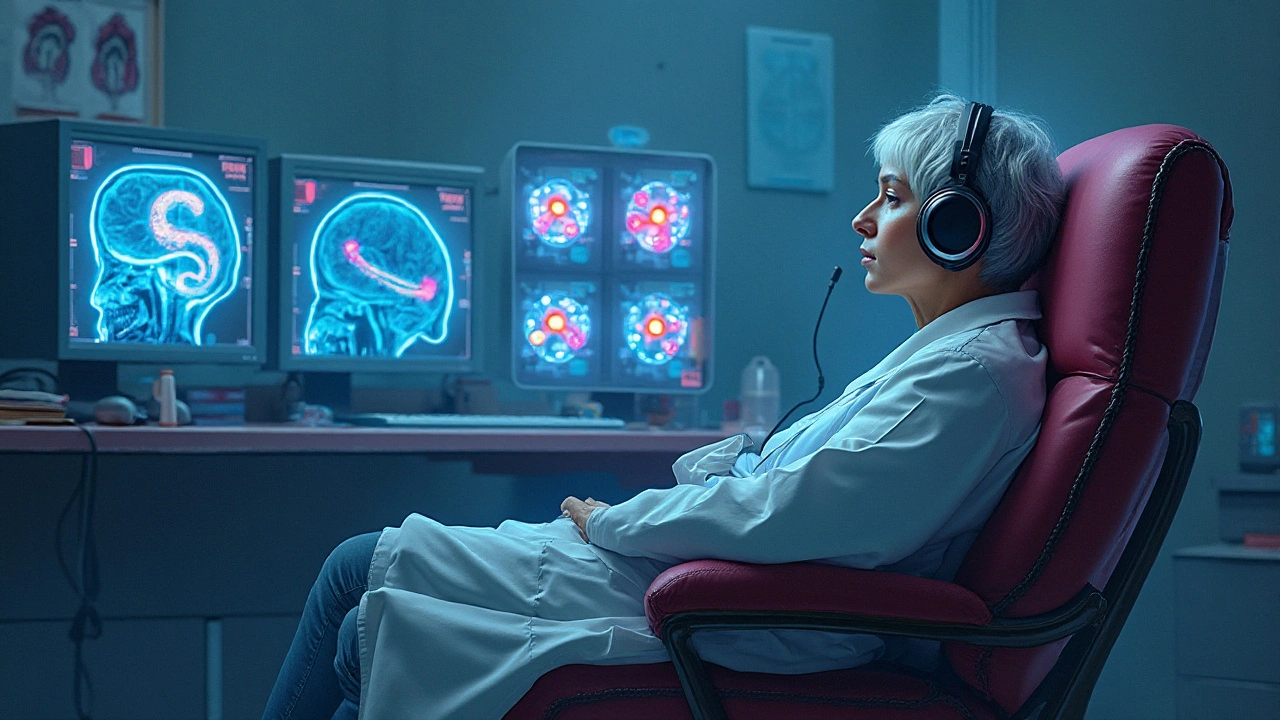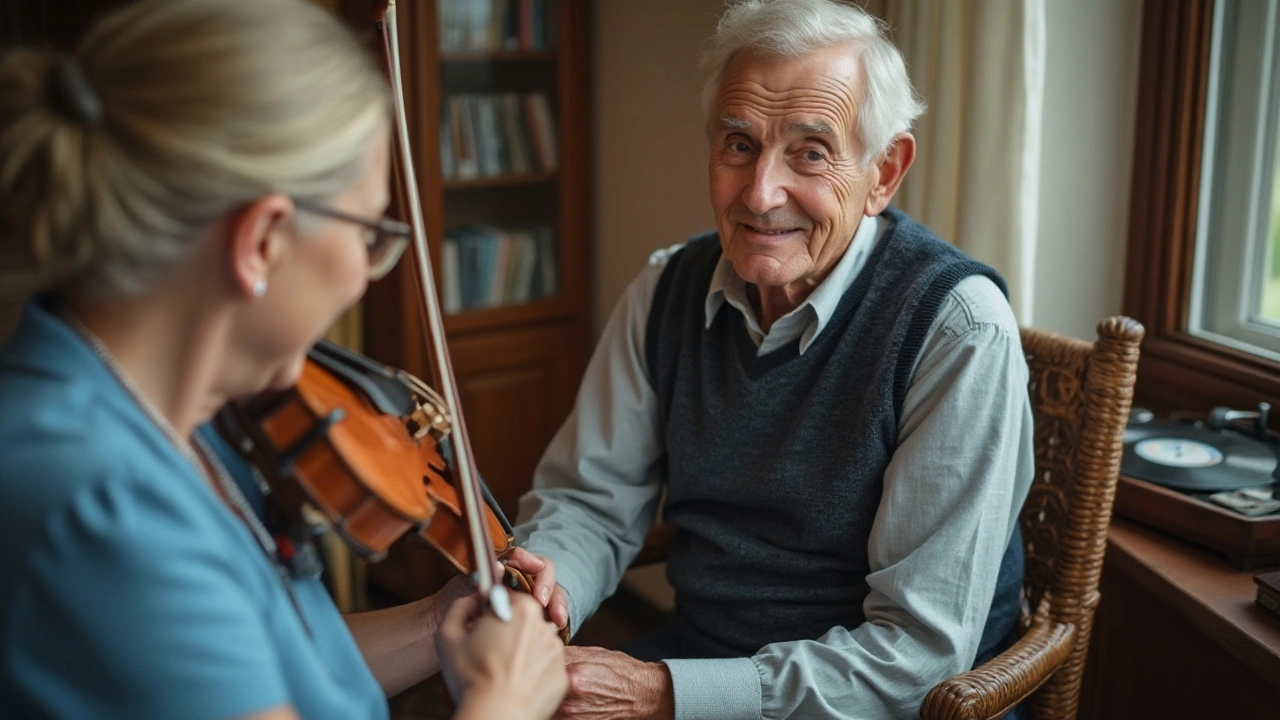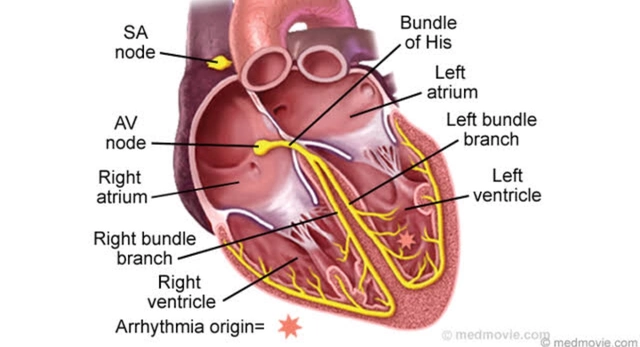Alzheimer’s disease affects millions around the globe, leaving a lasting impact on individuals, families, and the healthcare system. While there is no cure yet, various treatments help manage symptoms, and music therapy has emerged as an effective method.
Music possesses a unique ability to touch the human soul. Individuals with Alzheimer's often respond to music in ways they might not react to other stimuli. This connection lies in the brain's ability to tap into musical memories, even when other memories have faded.
The beauty of music therapy is in its simplicity. Through singing, listening, and playing instruments, patients experience moments of joy, improved mood, and sometimes even verbal recall. It offers a way to connect with loved ones and caregivers in deeper, more meaningful ways.
From classical compositions to favorite oldies, music therapy becomes a journey of discovering what resonates most with each individual. And the results — better cognitive functions, reduced anxiety, and a rediscovered sparkle in their eyes — speak volumes about its potential.
- Understanding Alzheimer's Disease
- How Music Affects the Brain
- Techniques and Approaches in Music Therapy
- Stories and Case Studies
Understanding Alzheimer's Disease
Alzheimer's disease is a progressive neurological disorder, causing brain cells to degenerate and die. It is the most common cause of dementia, a collective term for conditions characterized by a severe decline in memory and other cognitive abilities which interfere with daily life. An estimated 5.8 million Americans aged 65 and older are living with Alzheimer's in 2024, a number that's expected to nearly triple by 2050.
The exact cause of Alzheimer’s is not entirely understood, but it is believed to involve a combination of genetic, environmental, and lifestyle factors that affect the brain over time. Age is the greatest known risk factor, with most people displaying symptoms by their mid-60s. Other risk factors include a family history of the disease, certain genetic mutations, and conditions like high blood pressure and diabetes. Surprisingly, education appears to play a role, with lower levels linked to higher risks.
Alzheimer’s begins with mild memory loss and gradual cognitive decline. Early signs include difficulty remembering recent events or conversations, confusion about time and place, and trouble with problem-solving or planning. As the disease advances, symptoms intensify, leading to severe memory impairment and loss of the ability to carry out daily tasks. Advanced stages can result in loss of communication skills, changes in personality and behavior, and complete dependence on caregivers.
Diagnosis is typically based on medical history, physical and neurological examinations, and neuropsychological tests. Brain imaging and biomarkers are also increasingly used to detect signs of the disease before symptoms manifest. Currently, no cure exists, but treatments like drug therapy and lifestyle changes aim to manage symptoms. Non-pharmacological approaches, such as memory care activities and music therapy, play a critical role in improving quality of life for those affected by the disease.
The economic and emotional burden of Alzheimer's cannot be understated. Families often deal with immense stress as they provide daily care, navigating the complexities of the healthcare system. The cost of care for Alzheimer's patients in the United States is projected to surpass $1 trillion by 2050. Despite these challenges, ongoing research offers hope for future breakthroughs in understanding, treating, and ultimately preventing the disease.
Alzheimer's disease may take away memory, but it doesn't take away dignity. - Teepa Snow, Dementia Care Expert

How Music Affects the Brain
Music is far more than mere sound; it’s a powerful brain stimulator. From early childhood to late adulthood, our brains respond to music in profound ways. When it comes to Alzheimer's treatment, those responses can be particularly beneficial.
Neuroscientists have discovered that music stimulates many regions of the brain at once. This stimulation spans areas responsible for emotion, memory, and motor skills. When an Alzheimer's patient hears a familiar melody, the brain's memory areas light up, even if other regions are deteriorated. These musical memories are often retained because they are stored in multiple parts of the brain.
Furthermore, the rhythm and beat of music therapy can trigger physical movement. Patients who struggle with mobility may tap their feet or clap along to the rhythm, demonstrating an instinctive ability to connect with the music. This movement helps improve motor skills and muscle memory, essential for daily tasks. The emotional impact of music can also be significant. Listening to a favorite song can reduce anxiety, lower stress, and elevate mood. This is particularly crucial for Alzheimer's patients, who often experience bouts of agitation and confusion.
Music's impact on language abilities should not be underestimated either. Singing familiar songs engages the brain’s language centers, sometimes bringing words back to those who have lost them. Simple tunes like nursery rhymes or familiar songs from their youth can become a bridge to verbal communication.
Research has shown that music isn't just beneficial in the moment; it can have lasting effects. Regular sessions of music therapy can improve cognitive function over time, helping to slow the progression of symptoms. Studies have found that neurochemicals released during musical engagement can promote better brain health. For instance, dopamine, a feel-good neurotransmitter, increases during enjoyable musical activities.
“Music can activate regions in the brain spared by Alzheimer’s disease, creating opportunities for communication and interaction that might otherwise be lost,” says Dr. Amee Baird, a neuropsychologist with expertise in music therapy.
Let's not forget the social aspect. Group music sessions provide a sense of community and belonging. Social interaction is beneficial for mental health, offering cognitive stimulation through conversation and shared experiences. This helps patients feel less isolated and more connected to the world around them.
In summary, music’s multi-faceted impact on the brain is incredibly potent. By tapping into emotional, cognitive, and physical regions, music therapy offers a holistic approach to treatment. It provides far-reaching benefits that enhance the quality of life for Alzheimer’s patients and their families, fostering moments of joy, improved cognition, and meaningful connections with others.

Techniques and Approaches in Music Therapy
When it comes to music therapy for Alzheimer’s, it’s not just about playing random songs. The approach is thoughtful, and therapists tailor the sessions to meet individual needs. A typical session often involves singing, instrument play, or just listening to music. Singing is especially powerful as it activates different parts of the brain and encourages verbal expression, even in those who might have lost speech abilities.
Listening to familiar music can evoke profound emotional and sometimes physical responses. For instance, a person who might be non-responsive could suddenly start tapping their feet or clapping their hands when a favorite song from their youth plays. This happens because the brain areas involved in musical memory are often less affected by Alzheimer’s.
Therapists might use a technique called “lyrical analysis” where they discuss the meaning of songs with participants. This can lead to conversations that reveal emotions and memories. It’s a way to connect and understand the patient’s inner world. Using headphones to deliver music can also be beneficial, especially in environments with a lot of distractions.
Group music therapy sessions can be equally rewarding. Participating in a choir or musical group fosters a sense of community and support. These sessions are not only social but also structured to include activities that stimulate cognitive functions. The shared experience of creating music together can be incredibly uplifting.
Sometimes, therapists use a method known as “music and movement.” This involves coordinating physical movements with music. It’s especially effective for those in the early to mid-stages of Alzheimer’s. Simple actions like swaying or marching in place to a rhythm can improve motor skills and coordination. It's also a great way to boost morale and engage those who might otherwise be sedentary.
Another engaging technique is the use of “live music.” Live performances can be more stimulating than recorded music. The interactive nature of live music allows for a more personalized experience. Musicians can adjust the tempo and volume according to the audience’s reactions, making it a dynamic and enriching session.
“Music can pierce the heart directly,” says Oliver Sacks, a famed neurologist. “It needs no mediation.” This thought encapsulates why music therapy can succeed where other interventions may fail. The direct connection to emotional and memory centers in the brain makes it incredibly effective.
In some cases, therapists incorporate the use of “musical instruments.” Patients might play simple percussion instruments like tambourines or maracas. The goal isn’t to play perfectly but to engage tactile senses and follow a rhythm. This activity can add layers of cognitive demand while being fun.
Finally, personalized playlists have shown promise. Family members and caregivers often help compile these playlists, ensuring the music has personal significance. The idea is to play these during daily routines to reduce anxiety and agitation. Research shows that personalized music can significantly improve the quality of life for Alzheimer’s patients.

Stories and Case Studies
One remarkable story is from a care facility in Wisconsin, where an elderly woman named Margaret, diagnosed with Alzheimer’s, showed noticeable transformation due to music therapy. Before therapy, Margaret was often emotionally distant and rarely spoke. However, when the therapy sessions introduced her to the tunes of Elvis Presley, she began to hum along. Over time, she started to sing and even share memories linked to the songs. Family members reported seeing a significant improvement in her mood and engagement.
Another touching case involves a man named John in Florida. John had been a jazz musician before he was diagnosed with Alzheimer’s. Traditional therapy had minimal impact on him, but his condition took a positive turn with music therapy. By playing his favorite jazz tracks, therapists helped him connect with his past and identity. His ability to recognize and respond to those around him improved significantly. His sessions often included impromptu drumming, which became an expressive outlet for his emotions.
Studies back these personal stories with scientific evidence. A 2021 study published in the Journal of Alzheimer's Disease showed that patients who participated in regular music therapy sessions experienced a 60% reduction in anxiety and agitation. This study highlights how the structure and familiarity of music can anchor patients in an otherwise confusing world.
Furthermore, a respected neurologist, Dr. Oliver Sacks, has often spoken about the benefits of music therapy. He famously said, "Music can lift us out of depression or move us to tears—it is a remedy, a tonic, orange juice for the ear. But for many of my neurological patients, music is even more—it can provide access, even when no medication can, to movement, to speech, to life."
"Music can provide access, even when no medication can, to movement, to speech, to life." — Dr. Oliver Sacks
A care facility in California implemented a music therapy program that engaged residents through personalized playlists. The selection process involved family members in identifying songs tied to meaningful life events—weddings, birthdays, holidays. For one resident, a WWII veteran named Frank, hearing the tunes from the 1940s brought a visible spark to his eyes. His daughter noted that the music helped in reviving his sense of self and identity.
These case studies and stories underscore the transformative power of music therapy for Alzheimer’s patients. By tapping into the emotional and cognitive aspects of the brain, music creates a bridge, helping patients regain a piece of themselves lost to the disease. Initially, the melody might be the hook, but it's the journey through memories and emotions that fosters a profound impact.





Your article glosses over the fact that most of these studies are funded by pharma lobbyists.
I’ve seen families light up when a favorite song sparks a memory that had been dormant for years. The simple act of humming a familiar chorus can turn a confused glance into a smile that says, “I’m still here.” In my work as a volunteer caregiver, I’ve organized weekly listening circles where classic rock and old Broadway tunes become bridges between patients and their grandchildren. Those sessions not only calm agitation but also give the caregivers a moment of shared joy, reducing burnout. The emotional resonance is real, and it’s backed by neuro‑science showing dopamine spikes during music engagement. So keep the playlists personal, and watch the “sparkle” return to those eyes.
They don't tell you that most of the funding behind music‑therapy research comes from corporations that want to keep seniors dependent on their services. The government pushes it as a ‘soft’ medical solution while ignoring cheaper, community‑based alternatives that have worked for generations. If you look at the data, the improvement rates plateau once the pharma‑sponsored programs end. Stay skeptical and demand transparent, independent trials.
When the first note of an old hymn drifts through the hallway, it is as if a ghostly lantern has been lit in the dim corridors of a fading mind.
The melody bypasses the crumbling synapses that have abandoned the patient’s recent memories, reaching back to the deep vaults of childhood recollection.
In one forgotten wing of a nursing home, Mrs. Patel, a septuagenarian who could no longer recognize her own reflection, began to tap her fingers in perfect time to a 1950s Bollywood ballad.
Her caregivers reported that the tapping soon turned into a shy hum, and within weeks she was able to recount the name of her first husband, a detail that had been lost for years.
Scientists, who are often reluctant to admit the power of art, finally measured a surge in acetylcholine levels during these sessions, a neurotransmitter intimately linked with memory consolidation.
What’s more, the rhythm acted as a metronome for the motor cortex, coaxing reluctant limbs to move in synchrony with the beat.
The social aspect cannot be overstated; a simple group chorus creates a sense of tribe that combats the crushing isolation of dementia.
Even skeptics have been forced to acknowledge that agitation scores dropped by nearly half in a double‑blind study that used personalized playlists versus generic radio.
But the true wonder lies not in the numbers, but in the moments when a flicker of recognition returns, however brief, like a lighthouse beam cutting through a stormy sea.
It is as if the brain, stubborn and obstinate, still holds a secret back door that music alone can pry open.
Considering the staggering economic burden-projected to exceed a trillion dollars by mid‑century-the cost‑effectiveness of a simple MP3 player is almost obscene.
Families who have incorporated daily song sessions report fewer emergency room visits and a calmer household atmosphere.
From a cultural perspective, the choice of genre matters; hymns, folk songs, and even local protest anthems can trigger identity‑linked memories that generic pop cannot.
Therefore, therapists should collaborate with relatives to curate playlists that are not merely pleasant but historically resonant.
In short, music does not just treat symptoms; it reaches into the soul, reminding us that even a fragmented mind can still feel, recall, and connect.
Music therapy is like a friendly hug for the brain, and I’ve seen it work wonders in local senior centers. When we play a mix of jazz and classic pop, the room fills with spontaneous foot‑tapping and laughter. It’s amazing how quickly the anxiety fades once a familiar tune starts. Keep the vibes up and the playlists personal!
The elite circles of academia hide the fact that many of these ‘breakthroughs’ are merely repackaged old folk songs. Only those who truly understand the cultural weight can appreciate the depth of this therapy.
I must stress that any caregiver who dismisses music therapy as a frivolous pastime is neglecting a proven, humane intervention. Ethical standards demand we incorporate all evidence‑based tools, especially those that enhance dignity. The literature, peer‑reviewed and statistically robust, shows consistent reductions in agitation. Therefore, programs with budget cuts that eliminate musical activities are, quite frankly, violating our moral responsibility to patients. Let us advocate for policy changes that enshrine such compassionate care.
Yo, i cant stress enough how dope music therapy is for the old folks. they start dancin n smilin when their jam comes on and u feel the vibe. let's get more of this in every care home!
The interplay between auditory stimulation and neuroplasticity represents a synergistic substrate for cognitive remediation in neurodegenerative pathology. From a biopsychosocial perspective, music functions as a multimodal cue that can recalibrate affective homeostasis. Implementing a stratified protocol-baseline neuroimaging, personalized auditory stimulus, longitudinal outcome metrics-optimizes therapeutic fidelity. In practice, this translates to a measurable decrement in neuropsychiatric inventory scores and an uplift in quality‑of‑life indices.